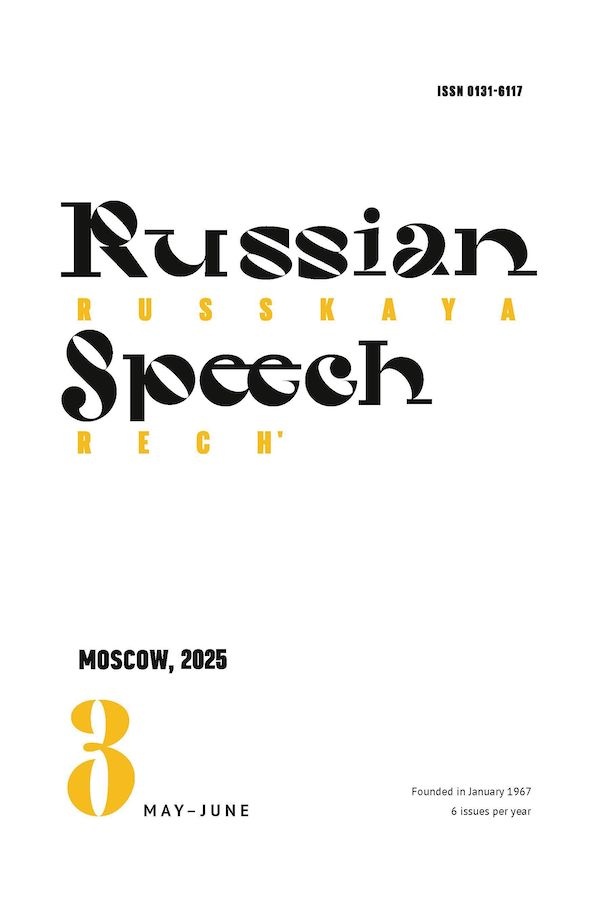Could you turn on the light please? (Using introductory word please in indirect questions and requests)
- Авторлар: Fedosyuk M.Y.1, Baklanova I.I.2
-
Мекемелер:
- Lomonosov Moscow State University
- National Research Nuclear University MEPhI (Moscow Engineering Physics Institute)
- Шығарылым: № 3 (2025)
- Беттер: 63-76
- Бөлім: Issues of Modern Russian Language
- URL: https://ter-arkhiv.ru/0131-6117/article/view/688669
- DOI: https://doi.org/10.31857/S0131611725030043
- ID: 688669
Аннотация
The article is aimed at explaining the reasons why the introductory word please began to be used quite often as a part of indirectly expressed questions and requests in the modern Russian everyday speech. From the point of view of the Russian language norm, such construction is incorrect due to its redundancy: the semantics of the request here is expressed, on the one hand, implicitly, using an indirect speech act, and on the other hand, explicitly, through the introductory word please. As the article shows, the modern tendency towards non-normative use of the word please can be explained by the continuously increasing since the end of the 19th century heterogeneity of the Russian linguistic community. Due to the process of internal migration of the Russian population, which began during the period of industrialization of Russia, as well as due to the steadily expanding use of remote means of mass communication (radio, television, Internet) in recent decades, many Russian speakers have developed a need to take into account that the knowledge of their recipients may not completely coincide with their own knowledge. This entails the desire, as far as possible, to reduce the use of implicit means of expressing meanings and give preference to explicit means. Since the semantics of the request, idiomatically expressed by the entire structure of the sentence, may not be understood by an uninformed addressee, the sentence additionally includes an excessive explicit indicator of the request — the word please.
Толық мәтін
Авторлар туралы
Mikhail Fedosyuk
Lomonosov Moscow State University
Хат алмасуға жауапты Автор.
Email: m.fedosyuk@yandex.ru
Ресей, Moscow
Irina Baklanova
National Research Nuclear University MEPhI (Moscow Engineering Physics Institute)
Email: ibaklanova@yandex.ru
Ресей, Moscow
Әдебиет тізімі
- Baranov A. N., Dobrovol’skii D. O. [Idiomaticity]. Russkii yazyk: Entsiklopediya [The Russian Language: Encyclopedia]. Moscow, AST-PRESS SHKOLA Publ., 2020, pp. 198–199. (In Russ.)
- Bulygina T. V., Shmelev A. D. Yazykovaya kontseptualizatsiya mira (na materiale russkoi grammatiki) [Language conceptualization of the world (based on the material of Russian grammar)]. Moscow, School “Languages of Russian Culture” Publ, 1997. 576 p.
- Evgen’eva A. P. (ed.). Slovar’ russkogo yazyka [Dictionary of the Russian Language]. In 4 volumes. Vol. 3. Moscow, Russkii Yazyk Publ., 1983. 752 p.
- Fedosyuk M. Yu. [“Nedarom pomnit vsya Rossiya pro den’ ... Borodino”, or Why toponyms ending on -ino, -ovo stop to be declined]. Vestnik Moskovskogo gosudarstvennogo oblastnogo universiteta. Seriya “Russkaya filologiya”, 2019, no. 5, pp. 333–341. (In Russ.).
- Fedosyuk M. Yu. [On the reasons for the growth of analyticism and productivity of non-idiomatic nominations in the Russian language of our days]. Vestnik Moscowskogo universiteta, seriya 19 “Lingvistika i mezhkul’turnaya kommunikatsiya”, 2022, no. 4. pp. 9–19. (In Russ.)
- Fedosyuk M. Yu., Baklanova I. I. [Teatral’nyi Proezd or Proezd Teatra? (Concorded and Unconcorded Attributes in Russian Street Names)]. Izvestiya Rossiiskoi akademii nauk. Seriya literatury i yazyka, 2021, Iss. 80, no. 2, pp. 87–97. (In Russ.)
- Gak V. G. [Analyticism]. Lingvisticheskii ehntsiklopedicheskii slovar’ [Linguistic encyclopedic dictionary]. Yartseva V. N. (ch. ed.). Moscow, Sovetskaya Ehntsiklopediya Publ., 1990, p. 31. (In Russ.)
- Il'ina N. E. [The growth of analyticism in morphology]. Russkii yazyk kontsa XX stoletiya (1985–1995) [The Russian language at the end of the twentieth century (1985–1995)]. Moscow, Yazyki Russkoi Kul’tury Publ, 1996, pp. 326–344. (In Russ.)
- Mel'nikov G. P. Sistemnaya tipologiya yazykov: Printsipy, metody, modeli [Systemic typology of languages: Principles, methods, models]. Moscow, Nauka Publ., 2003. 395 p.
- Paducheva E. V. Vyskazyvanie i ego sootnesennost’ s deistvitel’nost’yu (Referentsial’nye aspekty semantiki mestoimenii) [The statement and its correlation with reality (Referential aspects of the semantics of pronouns)]. Moscow, Nauka Publ., 1985. 272 p.
- Panov M. V. (ed.). Russkii yazyk i sovetskoe obshchestvo: Morfologiya i sintaksis sovremennogo russkogo yazyka [Russian Language and Soviet Society: Morphology and Syntax of the Modern Russian Language]. Moscow, Nauka Publ., 1968. 368 p.
- Polikarpov A. A. Ehlementy teoreticheskoi sotsiolingvistiki [Elements of theoretical sociolinguistics]. Moscow University Publishing House, 1979. 154 p.
- Searle J. R. [Indirect speech acts]. Novoe v zarubezhnoi lingvistike [New in foreign linguistics], vol. 17, Moscow, Progress Publ, 1986, pp. 195–222. (In Russ.)
- Valgina N. S. Aktivnye protsessy v sovremennom russkom yazyke [Active Processes in the Modern Russian Language]. Moscow, Logos Publ., 2003. 304 p.









